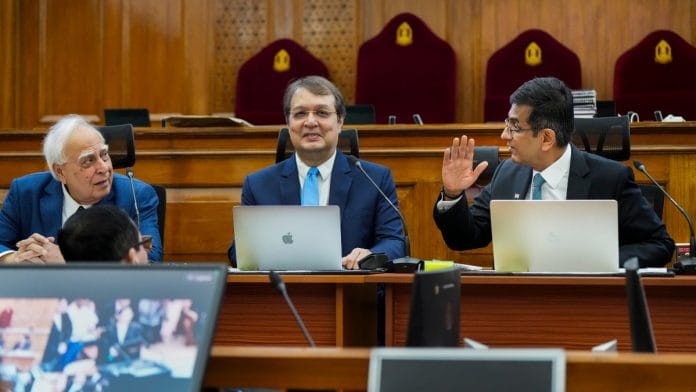New Delhi: The corridor outside court 1 to 5 of the Supreme Court was unusually brimming with lawyers on Monday during the post-lunch session. While some eagerly observed the notice boards outside these rooms, awaiting their turn to go in, others curiously walked in and out of them.
It was unlike any other first day of the week, when the same corridor in the top court wears a nearly deserted look as soon as the clock strikes 1 pm.
Monday and Friday in the Supreme Court are reserved for taking up fresh cases or miscellaneous matters that either get dismissed at the threshold or are entertained with a notice for further hearing. In normal course, judicial work on these two days of the week is over by lunchtime.
But Monday, 29 July, was different. It was the first day of the five-day Lok Adalat presided over by top-court judges — a first in the 75 years of the Supreme Court’s history. A Lok Adalat is one of the alternative resolution mechanisms that settles disputes outside the conventional court system.
Fourteen judges of the Supreme Court shed their judicial robes to change into formal wear and descended from their benches to be seated in the same area where their staff in the courtroom normally work.
Courtrooms 1 to 7 will be converted into Lok Adalats in the second half of the day for the next four days.
“We came here to get a glimpse of the Lok Adalat. This is happening for the first time in the Supreme Court with judges of this court sitting and resolving long-standing disputes,” said a group of young women lawyers who sat inside courtroom 1, where Chief Justice of India D.Y. Chandrachud headed the Lok Adalat panel that settled decades-old sales-tax-related appeals.
Also read: Regulation vs taxation — what majority said in SC judgment allowing states to tax mining activity
Comprising justices J.B. Pardiwala and Manoj Mishra, this panel also had senior advocate and Supreme Court Bar Association (SCBA) President Kapil Sibal and Supreme Court Advocates-on-Record Association (SCORA) President Vipin Nair.
The other six panels comprised four members, two judges, one senior advocate and one advocate-on-record of the top court.
More than 2,000 cases have been listed for the Lok Adalat hearings in the SC. On Monday, a little over 300 cases were heard on the first day of the Lok Adalat. These are small cases pending in the top court for several years. Most of the cases chosen involve service disputes, labour disputes, land acquisition, motor accident claims, compensations and cheque-bouncing matters.
According to the Supreme Court registry and lawyers whose cases would be taken up in these Lok Adalat proceedings, the top court first identified those matters that could be settled. It then distributed them state-wise and, thereafter, reached out to the respective high courts that were told to contact the parties involved in the dispute for holding pre-conciliation talks.
“This exercise of speaking to both the parties was carried out at the district level, and accordingly a report was sent to the Supreme Court about cases in which the litigants were ready for a settlement. Finally, those matters were prepared and their lawyers in the top court were informed about the possible resolution,” one of the officials in the registry told ThePrint.
In contrast to judicial hearings, Lok Adalat proceedings end with a mutual consent decree recorded by a panel or person presiding over it. Often, the presiding judge participates in the mediation process and persuades the litigants to arrive at an amicable solution. This is what all top court judges heading these panels in the SC were seen doing Monday.
Justice Surya Kant, who successfully settled a motor-accident claim during the Lok Adalat Monday, took pains to explain to the insurance company lawyer the drawbacks of letting the matter linger in courts. He and senior advocate V.V. Giri were seen calculating the compensation amount to the petitioner — the accident victim’s family — on the latter’s mobile phone.
“If this matter remains pending, at best Rs 26 lakh would be awarded in his favour. We would like you to settle it with Rs 23 lakh,” Justice Surya Kant said, while refusing to bring down the interest amount that was originally fixed by the tribunal that ruled in the favor of the petitioner.
In courtroom 3 — Justices B.R. Gavai and M.M. Sundresh — wrapped up another five-year-old motor accident insurance claim case. Advocate Prabhati Nayak, who appeared for her client from Odisha, was very satisfied with the outcome. “The Lok Adalat restored the tribunal order that favored my client, but was set aside by the high court. The insurance company agreed to settle and finally the matter has concluded. That has left my client relaxed,” she said.
(Edited by Tikli Basu)






